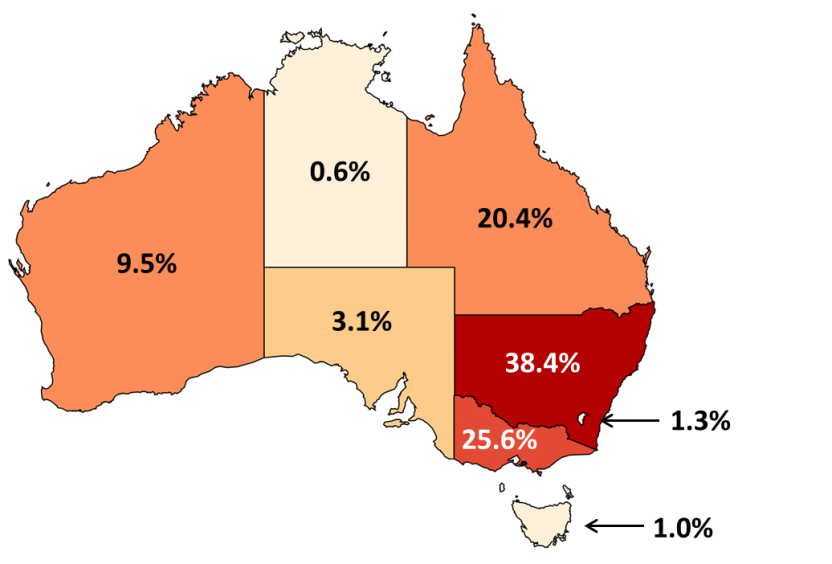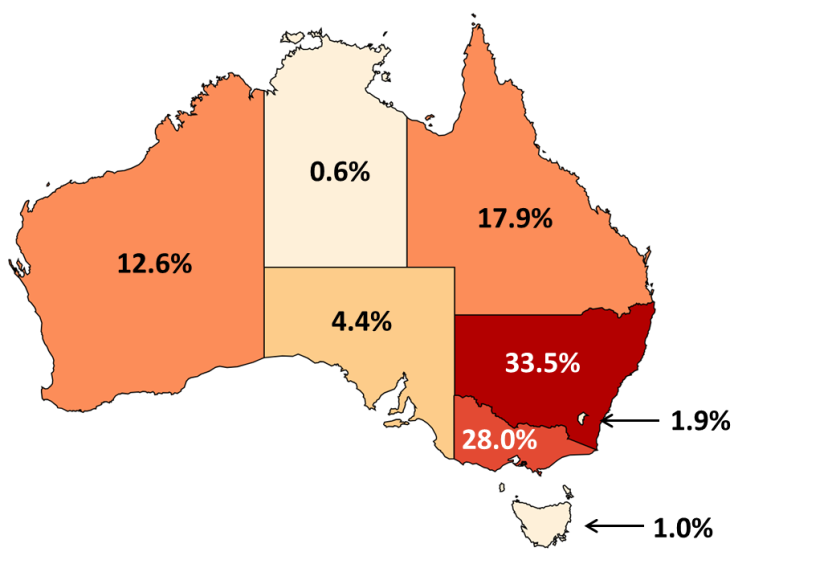11.3 Short-term visitor arrivals, Australia — year ending — monthly
[["Dec-83","Jan-84","Feb-84","Mar-84","Apr-84","May-84","Jun-84","Jul-84","Aug-84","Sep-84","Oct-84","Nov-84","Dec-84","Jan-85","Feb-85","Mar-85","Apr-85","May-85","Jun-85","Jul-85","Aug-85","Sep-85","Oct-85","Nov-85","Dec-85","Jan-86","Feb-86","Mar-86","Apr-86","May-86","Jun-86","Jul-86","Aug-86","Sep-86","Oct-86","Nov-86","Dec-86","Jan-87","Feb-87","Mar-87","Apr-87","May-87","Jun-87","Jul-87","Aug-87","Sep-87","Oct-87","Nov-87","Dec-87","Jan-88","Feb-88","Mar-88","Apr-88","May-88","Jun-88","Jul-88","Aug-88","Sep-88","Oct-88","Nov-88","Dec-88","Jan-89","Feb-89","Mar-89","Apr-89","May-89","Jun-89","Jul-89","Aug-89","Sep-89","Oct-89","Nov-89","Dec-89","Jan-90","Feb-90","Mar-90","Apr-90","May-90","Jun-90","Jul-90","Aug-90","Sep-90","Oct-90","Nov-90","Dec-90","Jan-91","Feb-91","Mar-91","Apr-91","May-91","Jun-91","Jul-91","Aug-91","Sep-91","Oct-91","Nov-91","Dec-91","Jan-92","Feb-92","Mar-92","Apr-92","May-92","Jun-92","Jul-92","Aug-92","Sep-92","Oct-92","Nov-92","Dec-92","Jan-93","Feb-93","Mar-93","Apr-93","May-93","Jun-93","Jul-93","Aug-93","Sep-93","Oct-93","Nov-93","Dec-93","Jan-94","Feb-94","Mar-94","Apr-94","May-94","Jun-94","Jul-94","Aug-94","Sep-94","Oct-94","Nov-94","Dec-94","Jan-95","Feb-95","Mar-95","Apr-95","May-95","Jun-95","Jul-95","Aug-95","Sep-95","Oct-95","Nov-95","Dec-95","Jan-96","Feb-96","Mar-96","Apr-96","May-96","Jun-96","Jul-96","Aug-96","Sep-96","Oct-96","Nov-96","Dec-96","Jan-97","Feb-97","Mar-97","Apr-97","May-97","Jun-97","Jul-97","Aug-97","Sep-97","Oct-97","Nov-97","Dec-97","Jan-98","Feb-98","Mar-98","Apr-98","May-98","Jun-98","Jul-98","Aug-98","Sep-98","Oct-98","Nov-98","Dec-98","Jan-99","Feb-99","Mar-99","Apr-99","May-99","Jun-99","Jul-99","Aug-99","Sep-99","Oct-99","Nov-99","Dec-99","Jan-00","Feb-00","Mar-00","Apr-00","May-00","Jun-00","Jul-00","Aug-00","Sep-00","Oct-00","Nov-00","Dec-00","Jan-01","Feb-01","Mar-01","Apr-01","May-01","Jun-01","Jul-01","Aug-01","Sep-01","Oct-01","Nov-01","Dec-01","Jan-02","Feb-02","Mar-02","Apr-02","May-02","Jun-02","Jul-02","Aug-02","Sep-02","Oct-02","Nov-02","Dec-02","Jan-03","Feb-03","Mar-03","Apr-03","May-03","Jun-03","Jul-03","Aug-03","Sep-03","Oct-03","Nov-03","Dec-03","Jan-04","Feb-04","Mar-04","Apr-04","May-04","Jun-04","Jul-04","Aug-04","Sep-04","Oct-04","Nov-04","Dec-04","Jan-05","Feb-05","Mar-05","Apr-05","May-05","Jun-05","Jul-05","Aug-05","Sep-05","Oct-05","Nov-05","Dec-05","Jan-06","Feb-06","Mar-06","Apr-06","May-06","Jun-06","Jul-06","Aug-06","Sep-06","Oct-06","Nov-06","Dec-06","Jan-07","Feb-07","Mar-07","Apr-07","May-07","Jun-07","Jul-07","Aug-07","Sep-07","Oct-07","Nov-07","Dec-07","Jan-08","Feb-08","Mar-08","Apr-08","May-08","Jun-08","Jul-08","Aug-08","Sep-08","Oct-08","Nov-08","Dec-08","Jan-09","Feb-09","Mar-09","Apr-09","May-09","Jun-09","Jul-09","Aug-09","Sep-09","Oct-09","Nov-09","Dec-09","Jan-10","Feb-10","Mar-10","Apr-10","May-10","Jun-10","Jul-10","Aug-10","Sep-10","Oct-10","Nov-10","Dec-10","Jan-11","Feb-11","Mar-11","Apr-11","May-11","Jun-11","Jul-11","Aug-11","Sep-11","Oct-11","Nov-11","Dec-11","Jan-12","Feb-12","Mar-12","Apr-12","May-12","Jun-12","Jul-12","Aug-12","Sep-12","Oct-12","Nov-12","Dec-12","Jan-13","Feb-13","Mar-13","Apr-13","May-13","Jun-13","Jul-13","Aug-13","Sep-13","Oct-13","Nov-13","Dec-13","Jan-14","Feb-14","Mar-14","Apr-14","May-14","Jun-14","Jul-14","Aug-14","Sep-14","Oct-14","Nov-14","Dec-14","Jan-15","Feb-15","Mar-15","Apr-15","May-15","Jun-15","Jul-15","Aug-15","Sep-15","Oct-15","Nov-15","Dec-15","Jan-16","Feb-16","Mar-16","Apr-16","May-16","Jun-16","Jul-16","Aug-16","Sep-16","Oct-16","Nov-16","Dec-16","Jan-17","Feb-17","Mar-17","Apr-17","May-17","Jun-17","Jul-17","Aug-17","Sep-17","Oct-17","Nov-17","Dec-17","Jan-18","Feb-18","Mar-18","Apr-18","May-18","Jun-18","Jul-18","Aug-18","Sep-18","Oct-18","Nov-18","Dec-18","Jan-19","Feb-19","Mar-19","Apr-19","May-19","Jun-19","Jul-19","Aug-19","Sep-19","Oct-19","Nov-19","Dec-19","Jan-20","Feb-20","Mar-20","Apr-20","May-20","Jun-20","Jul-20","Aug-20","Sep-20","Oct-20","Nov-20","Dec-20","Jan-21","Feb-21","Mar-21","Apr-21","May-21","Jun-21","Jul-21","Aug-21","Sep-21","Oct-21","Nov-21","Dec-21","Jan-22","Feb-22","Mar-22","Apr-22","May-22","Jun-22","Jul-22","Aug-22","Sep-22","Oct-22","Nov-22","Dec-22","Jan-23","Feb-23","Mar-23","Apr-23","May-23","Jun-23","Jul-23","Aug-23","Sep-23","Oct-23","Nov-23","Dec-23"],[[0.93999999999999995],[0.93999999999999995],[0.94999999999999996],[0.94999999999999996],[0.96999999999999997],[0.97999999999999998],[0.98999999999999999],[0.98999999999999999],[0.98999999999999999],[0.98999999999999999],[1],[1.01],[1.02],[1.02],[1.03],[1.0600000000000001],[1.0600000000000001],[1.0600000000000001],[1.0600000000000001],[1.0600000000000001],[1.0700000000000001],[1.0800000000000001],[1.0900000000000001],[1.1200000000000001],[1.1399999999999999],[1.1599999999999999],[1.1799999999999999],[1.2],[1.23],[1.24],[1.26],[1.29],[1.3100000000000001],[1.3300000000000001],[1.3500000000000001],[1.3899999999999999],[1.4299999999999999],[1.47],[1.5],[1.52],[1.54],[1.5700000000000001],[1.5900000000000001],[1.6200000000000001],[1.6599999999999999],[1.6899999999999999],[1.73],[1.75],[1.78],[1.8100000000000001],[1.8400000000000001],[1.8799999999999999],[1.9099999999999999],[1.9399999999999999],[1.99],[2.0499999999999998],[2.1099999999999999],[2.1600000000000001],[2.2000000000000002],[2.23],[2.25],[2.2599999999999998],[2.27],[2.2599999999999998],[2.2599999999999998],[2.2400000000000002],[2.2200000000000002],[2.1899999999999999],[2.1600000000000001],[2.1299999999999999],[2.0899999999999999],[2.0800000000000001],[2.0800000000000001],[2.0899999999999999],[2.0899999999999999],[2.1000000000000001],[2.1200000000000001],[2.1299999999999999],[2.1499999999999999],[2.1600000000000001],[2.1699999999999999],[2.1899999999999999],[2.2000000000000002],[2.21],[2.21],[2.2200000000000002],[2.21],[2.21],[2.2000000000000002],[2.21],[2.23],[2.25],[2.27],[2.3100000000000001],[2.3300000000000001],[2.3599999999999999],[2.3700000000000001],[2.3900000000000001],[2.4399999999999999],[2.4700000000000002],[2.5],[2.5099999999999998],[2.52],[2.5299999999999998],[2.5299999999999998],[2.52],[2.54],[2.5699999999999998],[2.6000000000000001],[2.6499999999999999],[2.6600000000000001],[2.7000000000000002],[2.7200000000000002],[2.7599999999999998],[2.79],[2.8100000000000001],[2.8500000000000001],[2.8900000000000001],[2.9199999999999999],[2.9500000000000002],[3],[3],[3.0600000000000001],[3.1099999999999999],[3.1400000000000001],[3.1400000000000001],[3.1699999999999999],[3.21],[3.23],[3.2599999999999998],[3.2999999999999998],[3.3199999999999998],[3.3599999999999999],[3.4100000000000001],[3.4300000000000002],[3.4399999999999999],[3.4700000000000002],[3.5],[3.54],[3.5800000000000001],[3.6200000000000001],[3.6400000000000001],[3.6600000000000001],[3.6899999999999999],[3.73],[3.7400000000000002],[3.8100000000000001],[3.8599999999999999],[3.8999999999999999],[3.9199999999999999],[3.9700000000000002],[3.9900000000000002],[4.0199999999999996],[4.0599999999999996],[4.0899999999999999],[4.1200000000000001],[4.1600000000000001],[4.1900000000000004],[4.21],[4.2300000000000004],[4.2199999999999998],[4.25],[4.25],[4.29],[4.29],[4.3099999999999996],[4.3300000000000001],[4.3300000000000001],[4.3200000000000003],[4.3200000000000003],[4.2699999999999996],[4.21],[4.2300000000000004],[4.2199999999999998],[4.2199999999999998],[4.1900000000000004],[4.1900000000000004],[4.1799999999999997],[4.1699999999999999],[4.1600000000000001],[4.1699999999999999],[4.1699999999999999],[4.2199999999999998],[4.2699999999999996],[4.2599999999999998],[4.2800000000000002],[4.29],[4.2999999999999998],[4.3399999999999999],[4.3700000000000001],[4.4100000000000001],[4.46],[4.46],[4.4699999999999998],[4.5099999999999998],[4.5300000000000002],[4.5999999999999996],[4.6200000000000001],[4.6500000000000004],[4.6900000000000004],[4.71],[4.7599999999999998],[4.79],[4.8300000000000001],[4.9299999999999997],[4.9900000000000002],[4.9800000000000004],[5],[5],[5.0099999999999998],[5.0300000000000002],[5.0499999999999998],[5.0599999999999996],[5.0199999999999996],[4.9800000000000004],[4.8899999999999997],[4.8600000000000003],[4.8200000000000003],[4.8300000000000001],[4.8399999999999999],[4.7999999999999998],[4.7999999999999998],[4.7699999999999996],[4.7400000000000002],[4.7300000000000004],[4.7199999999999998],[4.7699999999999996],[4.8300000000000001],[4.8399999999999999],[4.8600000000000003],[4.8499999999999996],[4.79],[4.7599999999999998],[4.6900000000000004],[4.6600000000000001],[4.6500000000000004],[4.6399999999999997],[4.6699999999999999],[4.6799999999999997],[4.71],[4.75],[4.7699999999999996],[4.7999999999999998],[4.8399999999999999],[4.9199999999999999],[5],[5.0599999999999996],[5.1100000000000003],[5.1500000000000004],[5.1600000000000001],[5.1699999999999999],[5.1699999999999999],[5.2000000000000002],[5.2400000000000002],[5.2800000000000002],[5.3499999999999996],[5.3499999999999996],[5.3600000000000003],[5.3700000000000001],[5.4000000000000004],[5.4299999999999997],[5.4500000000000002],[5.46],[5.4500000000000002],[5.46],[5.4699999999999998],[5.4500000000000002],[5.4199999999999999],[5.4500000000000002],[5.4400000000000004],[5.4500000000000002],[5.4299999999999997],[5.4100000000000001],[5.4199999999999999],[5.4299999999999997],[5.4500000000000002],[5.4900000000000002],[5.4800000000000004],[5.5099999999999998],[5.5499999999999998],[5.5499999999999998],[5.5800000000000001],[5.5899999999999999],[5.5999999999999996],[5.6200000000000001],[5.6299999999999999],[5.6299999999999999],[5.6399999999999997],[5.6100000000000003],[5.5999999999999996],[5.6399999999999997],[5.6299999999999999],[5.6200000000000001],[5.6399999999999997],[5.6200000000000001],[5.6699999999999999],[5.6500000000000004],[5.6200000000000001],[5.6100000000000003],[5.5800000000000001],[5.5700000000000003],[5.5899999999999999],[5.54],[5.5099999999999998],[5.54],[5.54],[5.5199999999999996],[5.4400000000000004],[5.4400000000000004],[5.4800000000000004],[5.5],[5.5199999999999996],[5.5599999999999996],[5.5499999999999998],[5.6100000000000003],[5.6500000000000004],[5.6299999999999999],[5.6299999999999999],[5.6699999999999999],[5.7199999999999998],[5.7599999999999998],[5.7999999999999998],[5.8099999999999996],[5.8399999999999999],[5.8700000000000001],[5.9000000000000004],[5.9000000000000004],[5.8799999999999999],[5.9100000000000001],[5.9199999999999999],[5.9000000000000004],[5.9000000000000004],[5.9100000000000001],[5.8700000000000001],[5.8700000000000001],[5.8799999999999999],[5.8700000000000001],[5.9000000000000004],[5.9000000000000004],[5.9400000000000004],[5.9500000000000002],[5.96],[5.9900000000000002],[5.9900000000000002],[6.0199999999999996],[6.0599999999999996],[6.0800000000000001],[6.1200000000000001],[6.1699999999999999],[6.1500000000000004],[6.21],[6.25],[6.25],[6.2699999999999996],[6.29],[6.3200000000000003],[6.3600000000000003],[6.3700000000000001],[6.4000000000000004],[6.4100000000000001],[6.4800000000000004],[6.5599999999999996],[6.5800000000000001],[6.5899999999999999],[6.6600000000000001],[6.71],[6.7300000000000004],[6.7800000000000002],[6.7999999999999998],[6.8200000000000003],[6.8700000000000001],[6.9000000000000004],[6.9199999999999999],[6.9100000000000001],[7],[7.0700000000000003],[7.0999999999999996],[7.1100000000000003],[7.1399999999999997],[7.1799999999999997],[7.21],[7.2599999999999998],[7.2999999999999998],[7.3600000000000003],[7.4500000000000002],[7.5199999999999996],[7.5899999999999999],[7.6699999999999999],[7.7300000000000004],[7.79],[7.8499999999999996],[7.9400000000000004],[8],[8.0700000000000003],[8.1400000000000006],[8.1899999999999995],[8.2699999999999996],[8.3800000000000008],[8.3599999999999994],[8.3800000000000008],[8.4700000000000006],[8.5099999999999998],[8.5600000000000005],[8.5899999999999999],[8.6600000000000001],[8.6799999999999997],[8.7200000000000006],[8.7799999999999994],[8.8200000000000003],[8.7899999999999991],[8.9199999999999999],[9.0199999999999996],[9],[9.0299999999999994],[9.0700000000000003],[9.0999999999999996],[9.1400000000000006],[9.1699999999999999],[9.1799999999999997],[9.1999999999999993],[9.25],[9.2699999999999996],[9.2899999999999991],[9.25],[9.2699999999999996],[9.3300000000000001],[9.3399999999999999],[9.3599999999999994],[9.4100000000000001],[9.4100000000000001],[9.4299999999999997],[9.4499999999999993],[9.4700000000000006],[9.5],[9.2599999999999998],[8.7599999999999998],[8.0600000000000005],[7.3899999999999997],[6.7400000000000002],[5.9500000000000002],[5.1600000000000001],[4.4699999999999998],[3.7000000000000002],[2.8999999999999999],[1.8300000000000001],[1.0700000000000001],[0.39000000000000001],[0.070000000000000007],[0.089999999999999997],[0.12],[0.14999999999999999],[0.17000000000000001],[0.17000000000000001],[0.17000000000000001],[0.17000000000000001],[0.17999999999999999],[0.25],[0.29999999999999999],[0.38],[0.55000000000000004],[0.76000000000000001],[0.94999999999999996],[1.1899999999999999],[1.5],[1.8400000000000001],[2.21],[2.6299999999999999],[3.1200000000000001],[3.6899999999999999],[4.0499999999999998],[4.5599999999999996],[5],[5.3099999999999996],[5.5899999999999999],[5.8600000000000003],[6.1600000000000001],[6.4100000000000001],[6.6200000000000001],[6.7999999999999998],[6.96],[7.1900000000000004]]]
[{"value":"COVID-19","annote_text":null,"x_value":"446","y_value":"0.14","x_axis":"0","y_axis":"0","x_offset":"-80","y_offset":"-30","cell_row":null,"cell_column":null},{"value":"GFC","annote_text":null,"x_value":"309","y_value":"5.33","x_axis":"0","y_axis":"0","x_offset":"0","y_offset":"70","cell_row":null,"cell_column":null},{"value":"SARS","annote_text":null,"x_value":"236","y_value":"4.54","x_axis":"0","y_axis":"0","x_offset":"0","y_offset":"70","cell_row":null,"cell_column":null},{"value":"2001 Sept 11 attacks","annote_text":null,"x_value":"214","y_value":"4.9","x_axis":"0","y_axis":"0","x_offset":"0","y_offset":"149","cell_row":null,"cell_column":null},{"value":"Olympics","annote_text":null,"x_value":"206","y_value":"5.1","x_axis":"0","y_axis":"0","x_offset":"0","y_offset":"-65","cell_row":null,"cell_column":null},{"value":"Asian financial crisis","annote_text":null,"x_value":"172","y_value":"4.1","x_axis":"0","y_axis":"0","x_offset":"0","y_offset":"82","cell_row":null,"cell_column":null},{"value":"Expo","annote_text":null,"x_value":"59","y_value":"2.3","x_axis":"0","y_axis":"0","x_offset":"0","y_offset":"-40","cell_row":null,"cell_column":null}][{"value":"0","axis_id":"0","axis_title":"","axis_units":"","tooltip_units":"","table_units":"","axis_min":null,"axis_max":null,"tick_interval":"24","precision":"-1","data_unit_prefix":"","data_unit_suffix":"","reverse_axis":false}][{"value":"0","axis_id":"0","axis_title":"Millions","axis_units":"","tooltip_units":"(M)","table_units":"(Millions)","axis_min":null,"axis_max":null,"tick_interval":null,"precision":"2","data_unit_prefix":"","data_unit_suffix":"","reverse_axis":false}]
